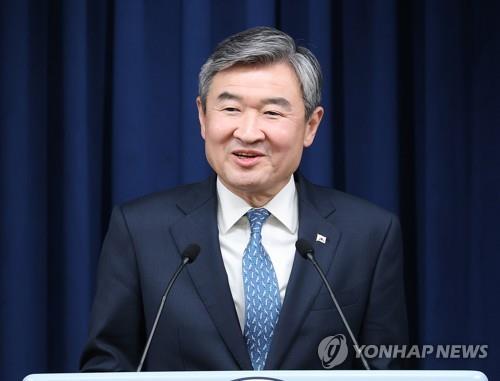- California Assembly OKs highest minimum wage in nation
- S. Korea unveils first graphic cigarette warnings
- US joins with South Korea, Japan in bid to deter North Korea
- LPGA golfer Chun In-gee finally back in action
- S. Korea won’t be top seed in final World Cup qualification round
- US men’s soccer misses 2nd straight Olympics
- US back on track in qualifying with 4-0 win over Guatemala
- High-intensity workout injuries spawn cottage industry
- CDC expands range of Zika mosquitoes into parts of Northeast
- Who knew? ‘The Walking Dead’ is helping families connect
Alliance with U.S. dramatically upgraded to ‘nuclear deterrence alliance’: national security adviser
National Security Adviser Cho Tae-yong said Monday that the alliance between South Korea and the United States has been significantly upgraded through a newly-adopted nuclear deterrence agreement.
Cho made the remark in an interview with YTN TV, referring to the Washington Declaration that President Yoon Suk Yeol and U.S. President Joe Biden adopted during a summit last week to bolster the U.S. “extended deterrence” commitment to defend South Korea by using all of its military capabilities, including nuclear weapons.
Under the deal, the allies agreed to establish the Nuclear Consultative Group to ensure South Korea’s say in the U.S. use of nuclear weapons and to deploy U.S. strategic assets, such as nuclear-armed submarines, to the Korean Peninsula more often to deter the North.
“If bombers, warships and submarines are all put together, we will be working in a situation effectively similar to the constant deployment of strategic assets,” Cho said. “The goal is to maintain the readiness to deploy strategic assets so as to surely punish North Korea if it plays with fire at any time during the 365 days of the year.”
In particular, Cho said, the upcoming visit by a nuclear ballistic missile submarine to South Korea is something unseen in nearly 40 years and means the U.S. will send all the strategic assets it can to ensure South Korea does not come under a North Korean nuclear attack.
“The South Korea-U.S. alliance was dramatically upgraded from an alliance based on conventional military power to a nuclear deterrence alliance,” he said.
Cho also highlighted Biden’s warning that the North’s regime would end if it uses nuclear weapons.
“What is important is that the U.S. president spoke words that if North Korea attacks South Korea with nuclear weapons, it would mean the end of the North Korean regime. It was the first time (for the U.S. president to say such things),” he said.
On the issue of Yoon’s suggestion of the possibility of South Korea shifting its policy of providing only non-lethal aid to Ukraine, Cho said Yoon’s point was that South Korea can take various things into account depending on developments in the Ukraine war or if large-scale humanitarian problems arise.
Cho also said he believes it was a “diplomatic gaffe” for China to denounce Yoon’s expression of opposition to changing the status quo across the Taiwan Strait by force as verbal meddling, saying Yoon only talked about a principle in international law.












